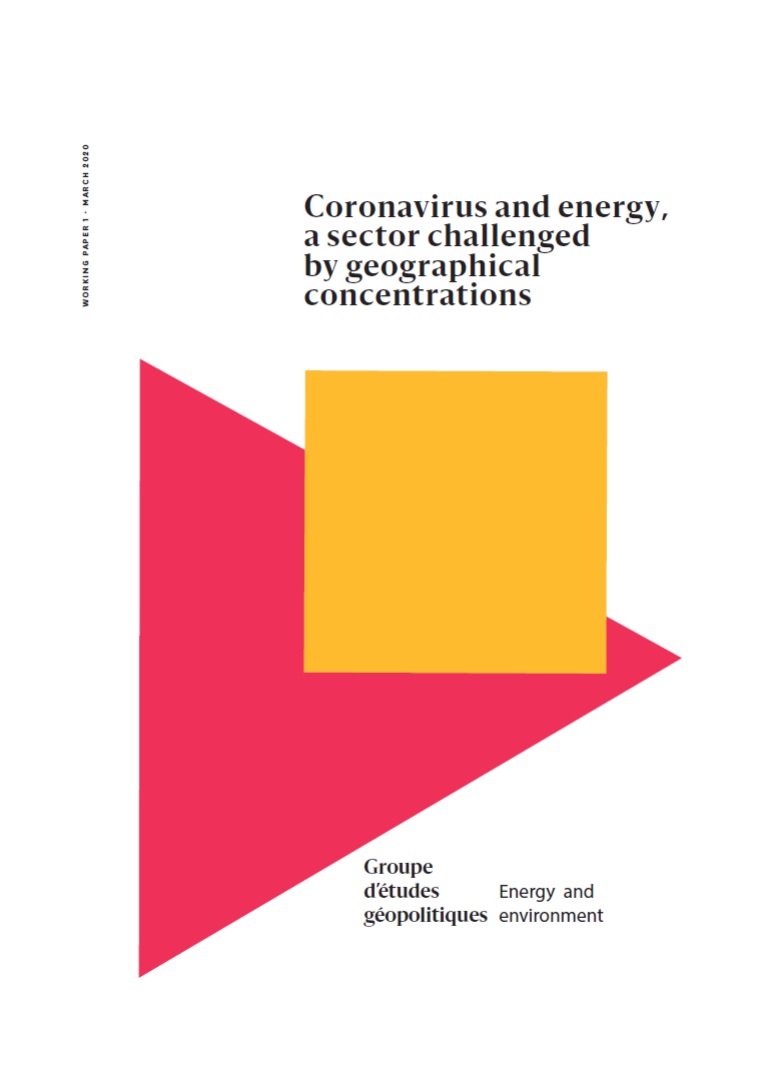Coronavirus and energy, a sector challenged by geographical concentrations
Tristan Metz
Télécharger le pdf
31/03/2020

Coronavirus and energy, a sector challenged by geographical concentrations
Tristan Metz

31/03/2020

 Voir tous les articles
Voir tous les articles
Coronavirus and energy, a sector challenged by geographical concentrations
Heterogeneous data, knowledge and profiles that rarely meet must be brought together to give shape, during the crisis, to the world that will come after. The Groupe d’études géopolitiques releases today, within the framework of the Covid-19 Geopolitical Observatory, its first working paper which reviews the state of play and formulates preliminary hypotheses on the short- and long-term effects of the pandemic on the energy sector, signed by Tristan Metz, with a foreword by Michel Derdevet.
CORONAVIRUS AND ENERGY, A SECTOR CHALLENGED BY GEOGRAPHICAL CONCENTRATIONS
- The crisis initiated by the coronavirus (SARS-CoV-2) has revived the well know chorus of the dangers of globalization and the interdependencies it induces. Recent months have once again highlighted China’s major role in the value chains of energy transition industries. At the same time, the price war on the oil markets has reminded us of the tension between their exposure to a small number of state actors and their importance for our economies.
- Conversely, our analysis, which is necessarily imperfect, of the initial economic effects of this energy crisis appears to outline another conclusion : the need for geographical diversification of energy value chains and not their concentration in a given country or region (China, France, the United States or elsewhere). However, this diversification is by no means self-evident and other factors, economic but also environmental and social, could legitimately obstruct it.
- Although the oil sector is experiencing a demand shock of unprecedented magnitude since the 2008 crisis, the fall in the price of crude oil which now threatens the balance of players rather seems to be the consequence of the indirect conflict that Russia and Saudi Arabia have been engaged in since March 8th. Indeed, the 1.8 million barrels per day (b/d) drop in world consumption over the first quarter induced by Chinese measures to counter the epidemic led to a fall from $60 to $50 per barrel in February – a sustainable price for the sector and the producing countries. The anticipated increase in production of more than 3 million b/d by Saudi Arabia (supported by its allies Kuwait, Iraq and the United Arab Emirates) led to a barrel at less than $251 – a much less sustainable level. Similar effects can be seen in gas markets. The market power of these ten players appears to be directly responsible, even if the demand shock provides a particularly favourable context for its exercise.
- In this context, renewable energies and electric mobility are in turn praised or seen as new sources of dependence. While some analysts see them as a response to our societies’ exposure to geopolitical conflicts and their after effects on oil and gas markets , others stress the dependence of these sectors on China.
- However, the consequences on the energy transition sectors and their value chains are more complex to assess and do not only involve supply constraints. They result from the non-trivial interaction of the disruptions in each chain, the conditions for granting subsidies in each country, and pre-existing tensions on production. The situation is therefore different between wind and solar, but also between the market in China and outside China. The Chinese situation illustrates in particular that locally producing panels or battery is not enough to be immune to a crisis of this magnitude.
- Ultimately, the crisis is expected to be felt in the transition sectors mainly through macro-economic effects. Indeed, the situation could lead to greater financing difficulties, a drop in energy demand, or changes in policies on the part of states or companies. The battery and electric vehicle sector is a very good example. In this context, any national production would not be spared either.
To support this initiative you can make a tax-exempt donation, or subscribe to Le Grand Continent, the journal published by Groupe d’études géopolitiques.
citer l'article
Tristan Metz, Coronavirus and energy, a sector challenged by geographical concentrations, Mar 2020,




